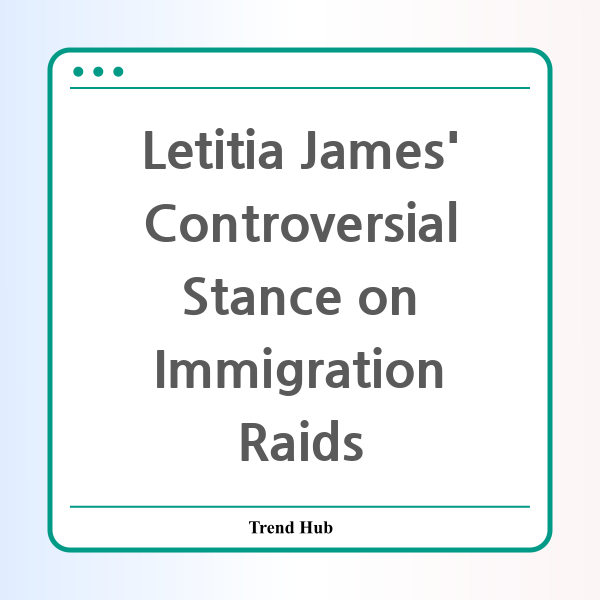* This website participates in the Amazon Affiliate Program and earns from qualifying purchases.

In the midst of a heated political climate surrounding immigration enforcement, New York Attorney General Letitia James is facing significant backlash for her remarks following a recent series of ICE raids in New York City. With immigration being a contentious issue across the United States, James’ comments have sparked a debate about public safety and the role of law enforcement.
As the federal government ramps up its immigration crackdowns, particularly under the direction of a new Homeland Security Secretary, James has expressed concern over the treatment of immigrants during these operations. She stated, "My office is aware of the increased presence of ICE across New York City. I am monitoring the situation to ensure our laws are being respected and people's rights are not being violated." However, many critics argue that her focus on immigrant rights might overshadow the responsibilities of public safety.
The criticism extends from within the law enforcement community itself. Some argue that local politicians, including James, should align their priorities with those of law enforcement officers who are directly responsible for the safety of their communities. NYC Sergeant Joseph Imperatrice, founder of Blue Lives Matter NYC, pointedly remarked that the primary goal of elected officials should be to ensure the safety of their constituents, suggesting that James’ approach may inadvertently hinder such efforts.
"The number one goal of any person in office is their constituents," Imperatrice said. He emphasized the need for political figures to work de facto with federal authorities to address violent crime effectively. With reports indicating that ICE's operations resulted in the arrest of individuals wanted for violent crimes, the urgency for collaboration between local and federal enforcement becomes paramount.
James, along with other critics of the raids, is advocating for a more humane approach towards undocumented immigrants, emphasizing that local law enforcement agencies are not legally permitted to detain individuals solely based on requests from federal immigration authorities without judicial warrants. This stance, while rooted in legal frameworks, places her at odds with local officers who view the crackdown as essential to community safety.
The backdrop to these events is a significant uptick in federal immigration enforcement, which has affected numerous communities across the U.S., particularly in areas designated as sanctuary cities like New York. While local governments have often resisted federal immigration mandates, they are caught in a complex interplay of legal obligations and community expectations.
As cities prepare for potential responses to the administration's aggressive immigration stance, James has vowed to take legal action against any federal measures she considers unconstitutional. Notably, this situation highlights the broader trend of increasing polarization on immigration policies between state and federal authorities.
Moreover, the issue is not merely a political rivalry; it encapsulates the real concerns of various stakeholders, including law enforcement officers dedicated to public safety, community members who feel the impacts of crime directly, and the immigrants navigating their precarious situations in a complex legal landscape.
In conclusion, as the debate over immigration enforcement continues to unfold, Letitia James’ position has illuminated the challenges lawmakers face in balancing legal rights and public safety. The upcoming months are likely to reveal whether her approach will resonate with a citizenry increasingly concerned about crime and safety, or if it will fuel further division among those advocating for immigrant rights and those prioritizing community security.
* This website participates in the Amazon Affiliate Program and earns from qualifying purchases.